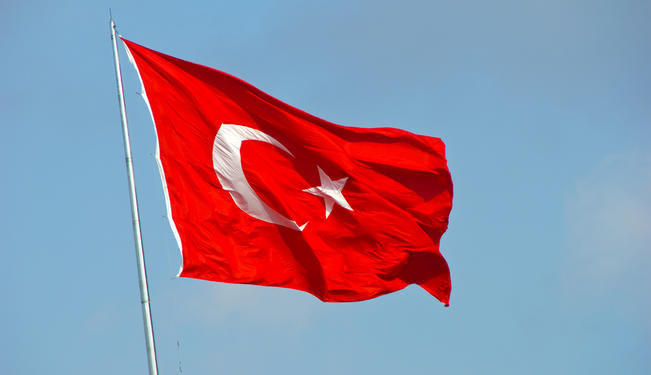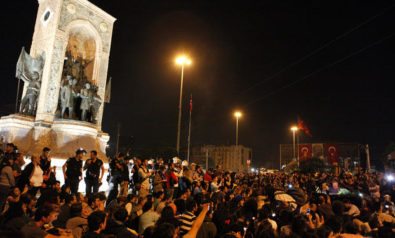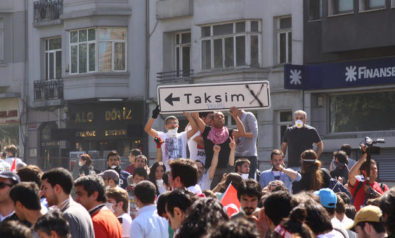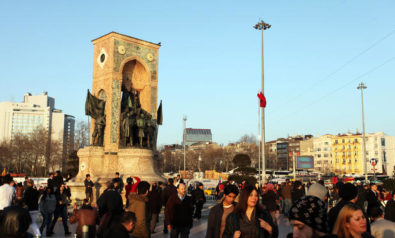The recent Turkish protests are about more than just Erdoğan’s style of leadership.
Some of the language used during the recent events in Turkey — and the media reaction to it, particularly in the West — warrants closer scrutiny.
Not only has there been talk of a Turkish Spring and of Taksim becoming a new Tahrir, but there have also been such statements as “we hope that Tayyip [Prime Minister Erdoğan] will have to go” and “this is our museum…memories of the days when a dictator ruled Turkey” — quoted in The Observer on June 2.
While much Western coverage has taken such statements at face value and placed them within the context of the Arab Spring as yet another chapter in a Middle East awakening, it is important that a broader, and deeper perspective is presented.
The media attempt to associate the events of Taksim with those of Tahrir is — beyond the helpful alliteration — deeply misleading, especially to a Western audience less in touch with the context of the region. The protesters of Taksim and other urban centres in Turkey may appear to be a marginalised youth movement, but the reality is more nuanced.
Unlike Tahrir — and indeed, any of the Arab revolts — the political opposition that has lent its support to these Turkish protesters is not illegal, the protesters are not a deprived urban youth squeezed by the socio-economic effects of a state in financial crisis, and the leader they despise is not a dictator.
The Weight of History
In Turkey, even a protest against the redevelopment of an urban park is a highly politicised issue. Two key objections repeatedly raised by the protesters: one of the building projects on the Gezi Park is to rebuild an old Ottoman barracks; and a new Bosphorus bridge is to be named after an Ottoman Sultan.
It reveals a protest movement that is a hostage to Turkey’s political history. A rejection of the Ottoman past is deeply embedded in the traditional ideology of the state — Kemalism — as espoused by the Westernised, staunchly secular establishment through its political party, the Republican People’s Party (CHP), as well as key structures within the military, judiciary and bureaucracy.
The CHP was quick to back the protests. Hence, when the protesters call for the downfall of Prime Minister Erdoğan, they are not merely whistling in the wind. Though drawn from a broad range of interest groups, they are nonetheless expressing the desires of a key constituency that has traditionally controlled Turkish society.
Prime Minister Erdoğan is now a popular hate figure. What he represents is a major constituency rooted in provincial Anatolia — though many have migrated to urban centres — with a marked Islamic religious and cultural sensibility. These are values that are seen as regressive and Middle Eastern in origin by the sectors of society represented in the protests.
The Demographics of the Protest
At the core of these protests is a highly Westernised urban youth. In a recent survey by academics at Istanbul Bilgi University, 63.6% of respondents were aged between 19 and 30, and 92.1% did not vote for the ruling Justice and Development Party (AKP).
While 96.1% claimed a “respect for liberties” was a core demand of the protests, this reveals contradictions at the heart of the debate. For example, Turkey is a country in which it is illegal for a woman to wear an Islamic headscarf in state institutions. Yet, not only have women in headscarves been conspicuously absent from the protests, but the protesters have also not mentioned this civil rights issue.
Though 81.2% of the protesters surveyed claimed to be “libertarian” in outlook, their notion of civil liberties appears highly subjective. It is not civil liberties that are demanded so much as civil liberties for the Westernised and the staunchly secular.
Such demands closely correspond with the ideology of the traditional Turkish establishment. This convergence makes what appears to be a new protest movement rather less so. In fact, 6.6% of respondents called directly for a military coup, which has been the preferred method of removing Islamist politicians from power on several occasions in Turkish history.
Turkey’s Violent Past
Founded by army officers and ruled as a one-party state until the 1950s, Turkey’s military has since staged three coups d’état in 1960, 1971, and 1980 in order to remove governments of which it disapproved. It did so with the justification of upholding the principles of the republic and restoring law and order.
This was followed in 1997 by the so-called "coup by memorandum" in which the military advised the Islamist Prime Minister Necmettin Erbakan to leave office. Much of this military activity aimed at the suppression of political representation for a vast constituency in Turkey that identifies closely with Islam. Among them, Prime Minister Erdoğan has not been immune, having been imprisoned in 1998 after making a speech in which he recited a poem viewed as “anti-secular”.
The ruling AKP is the latest manifestation of Islamist politics in Turkey, a political movement that can claim as much understanding of state repression as any. The traditional establishment has — through the military and the judiciary — outlawed the Islamist National Order Party (1971), the National Salvation Party (1980), the Welfare Party (1998), and the Virtue Party (2001). Turkey’s chief prosecutor has also made two attempts, in 2002 and 2008, to ban the AKP.
Military coups were initiated in the past — particularly the highly repressive coup of 1980 — upon the pretext of restoring law and order on the streets. This has since made the prospect of civil unrest an especially threatening one for Islamist politicians, and a potent weapon for the traditional, Westernised establishment.
The recent trials in the Ergenekon case revolved around this very question, with defendants accused of attempting to foment civil unrest in order to give the military a pretext for overthrowing the AKP. The reaction of the AKP to the protests must be understood in the context of this political environment, which has imbued the party with a siege mentality.
The Errors of the AKP
It can certainly be claimed that police tactics in dealing with the current protests have been heavy-handed and counter-productive. The liberal use of tear gas, pepper spray, and disproportionate violence does not calm a situation. Such tactics demand investigation and a review of police conduct.
Another crucial context for these protests is the increasing inflexibility, and perceived lack of responsiveness of the AKP administration. It has been in power for over a decade, and such a period invariably exposes the flaws of any political party. It has certainly made mistakes, most significantly the stalling of many aspects of the EU-driven reform programme.
However, the traditional, Westernised establishment must also take responsibility. In pursuing an obstructive policy towards the participation of Islamist politicians in Turkish political life, it created a culture of suspicion. Quite apart from the contentious Ergenekon case — which has led to successful prosecutions — the establishment has engaged in actions such as the judicial attempt to block President Gül’s candidacy. The result is a political debate in which both sides have become steadily more polarised.
The Cultural Battleground
For much of the 20th century, Turkey’s cultural battle was more one-sided. The dominant narrative was that of a culturally European and secular state in which the Islamic heritage of the Turkish people was largely erased through such actions as the suppression of religious orders and language, dress, and legal reforms. It was a narrative enforced by the strength of arms.
It is now being challenged. In approaching history, each constituency selects and ignores what validates its arguments. The protest movement argues that naming a Bosphorus bridge after Ottoman Sultan Selim is insulting to Alevis (a minority branch of Shi’ism) since Alevis were massacred during his 16th-century rule. Yet, this same movement does not question the naming of countless monuments after Atatürk, who ruled during the massacre of Alevis in Dersim in 1937-38.
What history bears out, however, is that no country is an unchanging monolith. All democratic societies must be able to evolve. What was constructed in the 1920s was the vision of men who, as products of their age and background, were in-thrall to Western European civilization and felt deep ambivalence towards Islam.
The problems Turkey currently faces are tied to the transition from a single monolithic cultural narrative to a period in which varying, often competing, cultural narratives vie for power and legitimacy. Whether all sides in this debate can receive and retain a sense of ownership over the Turkish project will depend on the actions of those involved.
The Chance of a New Turkey
The success of the AKP over the past decade has been twofold. Firstly, they have given a sense of ownership of the Turkish project to a previously marginalised constituency. Secondly, they have done so without a wholesale revolution that excludes the voices of the traditional, Westernised elite and its supporters. This is a political balancing act; one in which the respective powers of each side are shifting.
Turkey has a significant, and highly vocal, Westernised and staunchly secular population. Yet, three free and fair general elections have revealed that they are not a majority in the country. They are a powerful minority, with rights certainly, but not the right to demand how Turkey should be, as they have done for most of the 20th century.
In the changing political landscape of Turkey — where power has been flowing increasingly from the Westernised establishment towards a new, emerging class with profoundly different sensibilities — friction is inevitable. The recent protests are the latest and most vocal manifestation of this uneasy recalibration of Turkey’s identity.
If the AKP wishes to break with the monolithic narrative of Turkey’s 20th-century history, however, it must also attempt to break with the Kemalist notion of paternalistic government. The AKP must be mindful that it governs on behalf of all the people — not only the constituency that voted it into power. If it succeeds, it will ultimately be Turkey’s success.
The views expressed in this article are the author's own and do not necessarily reflect Fair Observer’s editorial policy.
Image: Copyright © Shutterstock. All Rights Reserved
Support Fair Observer
We rely on your support for our independence, diversity and quality.
For more than 10 years, Fair Observer has been free, fair and independent. No billionaire owns us, no advertisers control us. We are a reader-supported nonprofit. Unlike many other publications, we keep our content free for readers regardless of where they live or whether they can afford to pay. We have no paywalls and no ads.
In the post-truth era of fake news, echo chambers and filter bubbles, we publish a plurality of perspectives from around the world. Anyone can publish with us, but everyone goes through a rigorous editorial process. So, you get fact-checked, well-reasoned content instead of noise.
We publish 2,500+ voices from 90+ countries. We also conduct education and training programs
on subjects ranging from digital media and journalism to writing and critical thinking. This
doesn’t come cheap. Servers, editors, trainers and web developers cost
money.
Please consider supporting us on a regular basis as a recurring donor or a
sustaining member.
Will you support FO’s journalism?
We rely on your support for our independence, diversity and quality.









Comment